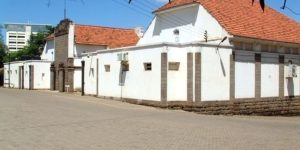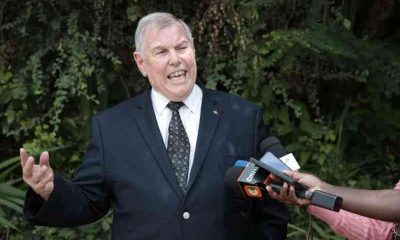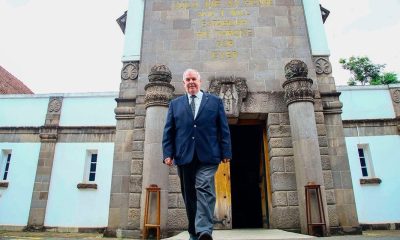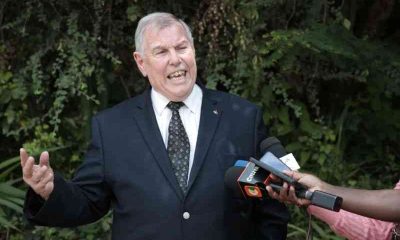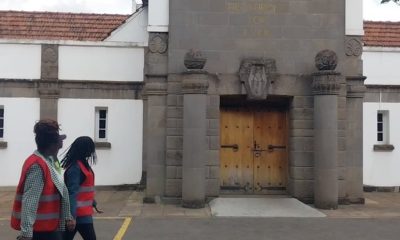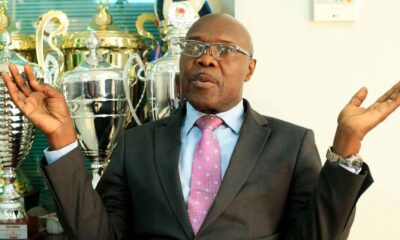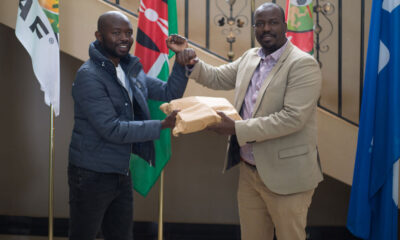Grapevine
Insider Information: The Untold Story of Freemasonry in Kenya
“I am not scared to say I am one of them, and it is something I don’t regret joining,” Rachier concludes.
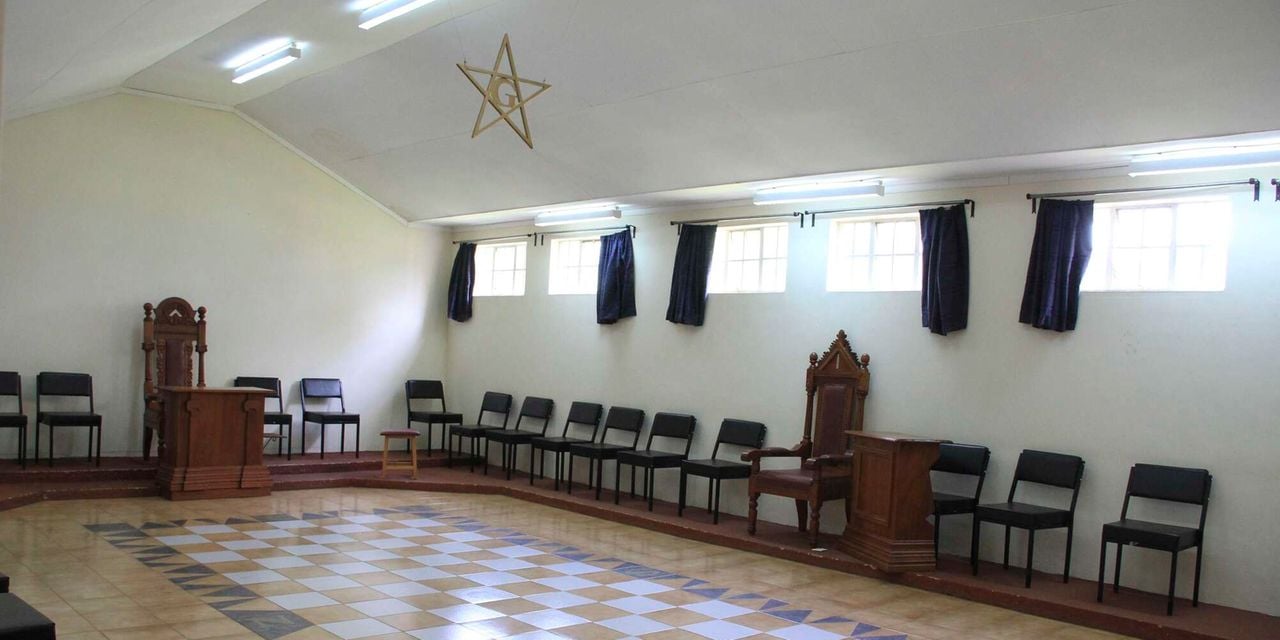
In the heart of Nairobi, on the quiet stretch of Nyerere Road, stands a building shrouded in whispers. Its colonial facade, modestly dignified, bears the weight of over a century of secrecy and symbolism.
This is the Freemasons’ Hall, a landmark often overlooked, yet central to one of Kenya’s most persistent cultural enigmas.
In May 14th, the veil was momentarily lifted when Nairobi County officials raided the premises and closed it over a Ksh.19 million land rate debt.
The operation, led by Health CEC Susan Silantoi, wasn’t unusual in administrative terms, it was part of a broader county-wide crackdown on revenue defaulters.
Yet the backlash online was immediate and electric, not because of unpaid dues, but because of who had been targeted: the Freemasons.
To many Kenyans, Freemasonry evokes a potent mix of fear, fascination, and folklore.
Long rumored to be a cabal of the wealthy and powerful, the organization is often accused without evidence of devil worship, secretive dealings, and supernatural acquisition of wealth.
But what lies beyond the conspiracy theories?
From European Fraternity to African Chapter
Freemasonry’s history in East Africa begins in colonial Zanzibar in 1905, where British settlers first introduced it. In those early days, membership was strictly reserved for Europeans.
Even as late as the 1930s, only a handful of lodges admitted Asians, and even fewer welcomed Africans, an institution that mirrored the racial exclusions of empire.
The landscape began to change in the mid-20th century.
A pivotal figure was Tanzanian businessman Sir Jayantilal Keshavji Chande, who joined the fraternity in 1954 after a two-year wait.
Over decades, he rose to become District Grand Master of East Africa, overseeing lodges in Kenya, Uganda, Tanzania, and the Seychelles.
In his writings, particularly “Whither Directing Your Course,” Chande argued passionately for the craft’s moral foundation: “Freemasonry admits a good man with a view to making him better.”
Contrary to popular belief, Freemasonry is not a religion—nor does it aim to replace one.
Members must profess belief in a Supreme Being, and lodges often contain the King James Bible, the Quran, the Bhagavad Gita, or other holy texts depending on the region. The philosophy, rooted in Enlightenment ideals, emphasizes brotherly love, relief, and truth.
Inside the Lodge: An Insider’s Account

Nairobi-based lawyer and Gor Mahia Football Club chairman Ambrose Rachier during a past interview at his office in February 2020. Mr Rachier says Freemasons have their own ceremonies; just like weddings or cultural functions like circumcisions, where there are certain rituals that they cannot talk about publicly.
Prominent Nairobi lawyer Ambrose Rachier, who has been a Freemason since 1994, offers a rare glimpse into this secretive world. “Our main objective is to engage in charity to help humanity,” Rachier explains.
“But in the process, we ensure that our intellectual faculties are all the time interrogated, and we also have what you can call companionship or fellowship through dinners and so forth.”
The society operates through a structured hierarchy of degrees, beginning with apprentice, then craft person, and finally master.
Beyond these initial three degrees lies a path to the 33rd degree symbolically significant as the age at which Jesus was crucified.
Rachier himself has reached the 30th degree after nearly three decades of membership.
According to Rachier, joining requires sponsorship from existing members. “It is a member’s organization in which someone who knows you very well invites you to join,” he says.
Prospective members undergo interviews and a vetting process to ensure they meet the fraternity’s standards of honor and charity.
“We are trying to build a group of people with the same interests… You need to be a good person.”
Meetings typically commence at 6 p.m. to accommodate working schedules and conclude by 9 p.m. with dinner at the Freemasons’ Hall.
Members dress in formal attire, including an apron that symbolizes building, a nod to the craft’s historical roots in stonemasonry. “We just wear a suit and some kind of apron to symbolize building, because when you go to build, you wear an apron,” Rachier explains.
The Mask of Mystery
Secrecy remains central to Freemasonry’s identity. From elaborate initiation rituals to the use of symbols like the square and compass, the fraternity guards its traditions with near-religious zeal.
And in Kenya, where religious and cultural interpretations often collide with colonial legacies, this secrecy breeds suspicion.
When asked about certain rituals, Rachier demurs: “I am not allowed to talk about it.”
He acknowledges the fraternity’s ceremonial aspects but insists they’re no different from religious or cultural observances.
“We have our own ceremonies, just like weddings or cultural functions like circumcisions, where there are certain rituals that we cannot talk about publicly.”
The mythos surrounding Freemasonry in Kenya intensified in the early 1990s during a moral panic over “devil worship.”
President Daniel arap Moi ordered an official commission of inquiry in 1994 to investigate alleged satanic practices infiltrating churches, schools, and allegedly Masonic lodges.
The commission’s report, largely withheld from the public, deepened the air of mistrust.
“We ushered them in and took them around and urged them to ask questions,” Rachier recalls of the commission’s visit to the Freemasons’ Hall.
“I think that was a good thing to open up for the world to see what Freemasons do and what they stand for.”
Debunking the Myths
Among the most persistent rumors is that Freemasonry involves human sacrifice for wealth and power.
Rachier vehemently denies this: “In the 28 years I have been a member, I have never seen a sacrifice. I have not seen anyone who has sacrificed anybody.”
Rather than requiring members to sacrifice family, Rachier claims to have introduced about 20 of his own family members and close associates to the fraternity.
“I have a son who is 43 years old and practices law with me in my firm here. I have other children, and I have suffered no death,” he says, countering the narrative that membership demands sacrificing loved ones.
He also dismisses the notion that Freemasonry is exclusively for the wealthy and powerful, “we join Freemasonry to propagate charity. There are a few wealthy people in Freemasonry, and there are those people who live ordinary lives like me. I am not a wealthy person, and I am not a powerful person.”
The organization has traditionally been male-only, though Rachier acknowledges that women’s lodges have emerged in the United States.
He compares this gender exclusion to historical practices in religious institutions, “just ask yourself, in Catholicism, the priesthood, for a long time, has been a preserve of men… These are things that as men, we need to address.”
Freemasonry’s global membership has steadily declined since the 1980s, including in Africa.
Younger generations, increasingly secular and skeptical, often see the fraternity as outdated.
But paradoxically, in Kenya, public curiosity has reached new heights.
Social media platforms fuel perceptions of Freemasonry as a shadowy power structure accessible only to elites.
This phenomenon may be partly psychological. In a society where inequality and corruption often dominate headlines, the idea of a secret society pulling the strings offers both a convenient explanation and a compelling narrative.
Freemasons continue to assert that the craft focuses on self-improvement and moral guidance not monetary enrichment.
“If you get to the Masonic Hall, the first thing you get is a citation of King Solomon to God saying, ‘I shall build you a house and you shall establish your throne forever,'” explains Rachier.
“In reference to building a temple for God, nothing could be further from satanic than that.”
The fraternity maintains lodges across East Africa, with branches in Mombasa, Kisumu, and Ruiru within Kenya, as well as in Tanzania, Uganda, and Seychelles.
Members regularly travel between these lodges for what they describe as brotherhood and charitable work.
A Building, a Symbol, a Mirror
The Freemasons’ Hall in Nairobi remains a silent witness to this ongoing tension between myth and reality.
Its colonial walls have seen Kenya through independence, political transformation, and cultural upheaval.
Today, as county revenue officers place chains on its gates, the building has once again become a mirror reflecting not just the fate of a debt-ridden organization, but the country’s deeper anxieties about power, secrecy, and truth.
Whether viewed as an exclusive gentleman’s club, a philanthropic network, or something more sinister, Freemasonry in Kenya resists easy categorization.
It is a story still unfolding, hidden in plain sight, yet now with voices like Rachier’s offering unprecedented insight into a world that has been, until recently, closed to public scrutiny.
“I am not scared to say I am one of them, and it is something I don’t regret joining,” Rachier concludes.
His candor marks a new chapter in the relationship between this ancient fraternity and a skeptical public, one that may gradually transform whispers into understanding, even as the rituals behind those colonial walls remain closely guarded.
Kenya Insights allows guest blogging, if you want to be published on Kenya’s most authoritative and accurate blog, have an expose, news TIPS, story angles, human interest stories, drop us an email on [email protected] or via Telegram
-

 News2 weeks ago
News2 weeks agoTHE FIRM IN THE DOCK: How Kaplan and Stratton Became the Most Scrutinised Law Firm in Kenya
-

 Economy2 weeks ago
Economy2 weeks agoIran Demands Arrest, Prosecution Of Kenya’s Cup of Joe Director Director Over Sh2.6 Billion Tea Fraud
-

 Grapevine1 week ago
Grapevine1 week agoA UN Director Based in Nairobi Was Deep in an Intimate Friendship With Epstein — He Even Sent Her a Sex Toy
-

 Business2 weeks ago
Business2 weeks agoKPC IPO Set To Flop Ahead Of Deadline, Here’s The Experts’ Take
-

 Politics2 weeks ago
Politics2 weeks agoPresident Ruto and Uhuru Reportedly Gets In A Heated Argument In A Closed-Door Meeting With Ethiopian PM Abiy Ahmed
-

 Investigations1 week ago
Investigations1 week agoHow Mexico Drug Lord’s Girlfriend Gave Him Away
-

 Business2 weeks ago
Business2 weeks agoSafaricom Faces Avalanche of Lawsuits Over Data Privacy as Acquitted Student Demands Sh200mn Compensation in 48 Hours
-

 Investigations2 weeks ago
Investigations2 weeks agoKenya’s DCI Opens Probe on Russian Man Who Secretly Filmed Sex Escapades With Women — But There’s a Slim Chance They’ll Ever Get Him

